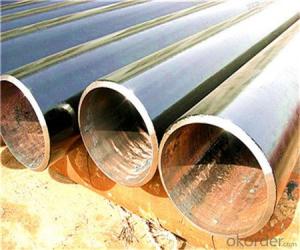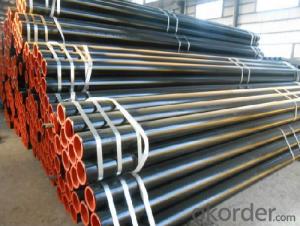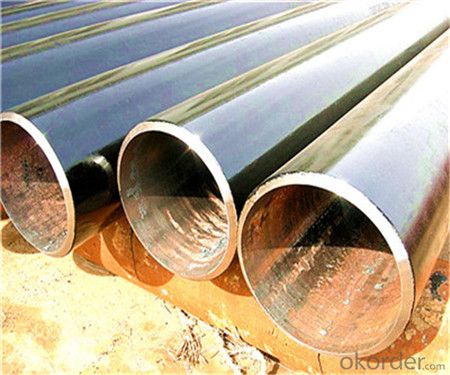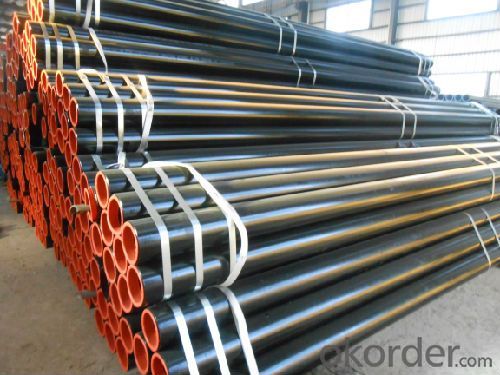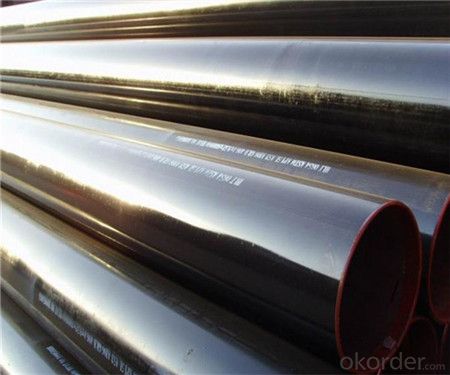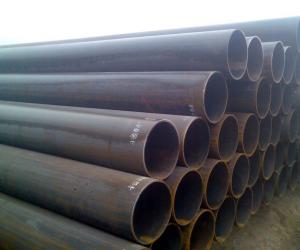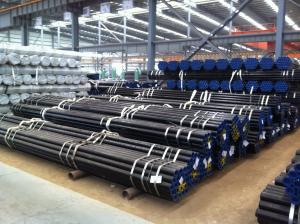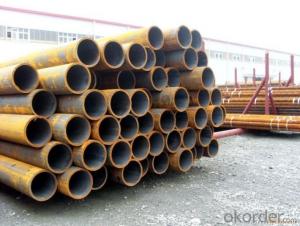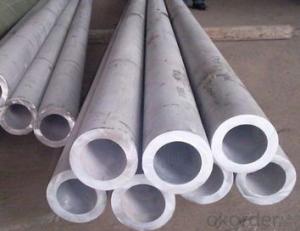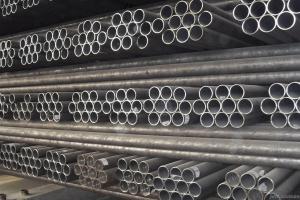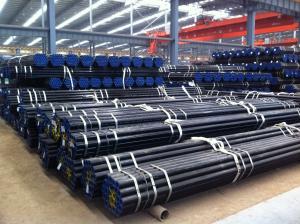Carbon Seamless Steel Pipe API 5L of 4 Inch Hot Sale Structuer Application
- Loading Port:
- Tianjin
- Payment Terms:
- TT OR LC
- Min Order Qty:
- 30 m.t.
- Supply Capability:
- 12000 m.t./month
OKorder Service Pledge
OKorder Financial Service
You Might Also Like
1、Structure of Carbon Seamless Steel Pipe API 5L of 4 Inch:
Seamless pipe is formed by drawing a solid billet over a piercing rod to create the hollow shell.
As the manufacturing process does not include any welding, seamless pipes are perceived to be stronger and more reliable.
Historically seamless pipe was regarded as withstanding pressure better than other types, and was often more easily available than welded pipe.
Standard: GB3087: Seamless Steel Tubes for Low and Medium Pressure Boiler
2、Main Features of the Seamless Pipe API 5L of 4 Inch
• High manufacturing accuracy
• High strength
• Small inertia resistance
• Strong heat dissipation ability
• Good visual effect
• Reasonable price
3、Seamless Pipe API 5L of 4 Inch Specification:
Standard | GB, DIN, ASTM ASTM A106-2006, ASTM A53-2007 |
Grade | 10#-45#, 16Mn 10#, 20#, 45#, 16Mn |
Thickness | 8 - 33 mm |
Section Shape | Round |
Outer Diameter | 133 - 219 mm |
Place of Origin | Shandong, China (Mainland) |
Secondary Or Not | Non-secondary |
Application | Hydraulic Pipe |
Technique | Cold Drawn |
Certification | API |
Surface Treatment | factory state or painted black |
Special Pipe | API Pipe |
Alloy Or Not | Non-alloy |
Length | 5-12M |
Outer Diameter | 21.3-610mm |
Grade | 20#, 45#, Q345, API J55, API K55, API L80, API N80, API P110, A53B |
Standard | ASME, ASTM |
4、Packaging & Delivery
Packaging Details: | seaworthy package,bundles wrapped with strong steel strip |
Delivery Detail: | 15-30days after received 30%TT |
5、FAQ of Seamless Pipe API 5L of 4 Inch:
①How is the quality of your products?
Our products are manufactured strictly according to national and internaional standard, and we take a test
on every pipe before delivered out. If you want see our quality certifications and all kinds of testing report, please just ask us for it.
Guaranteed: If products’ quality don’t accord to discription as we give or the promise before you place order, we promise 100% refund.
②How about price?
Yes, we are factory and be able to give you lowest price below market one, and we have a policy that “ for saving time and absolutely honest business attitude, we quote as lowest as possible for any customer, and discount can be given according to quantity”,if you like bargain and factory price is not low enough as you think, just don’t waste your time.Please trust the quotation we would give you, it is professional one.
③Why should you chose us?
Chose happens because of quality, then price, We can give you both.Additionally, we can also offer professional products inquiry, products knowledge train(for agents), smooth goods delivery, exellent customer solution proposals.Our service formula: good quality+good price+good service=customer’s trust
SGS test is available, customer inspection before shipping is welcome, third party inspection is no problem.
6、Seamless Pipe API 5L of 4 Inch Images:
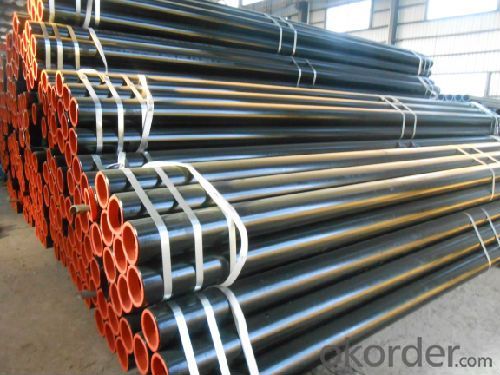
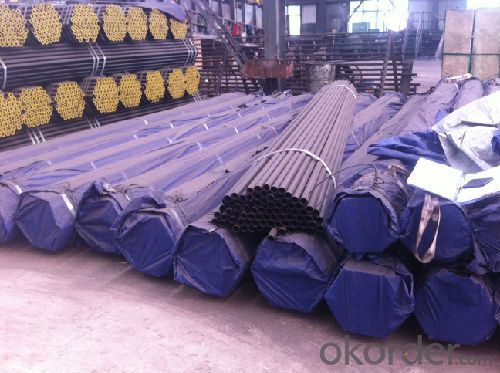
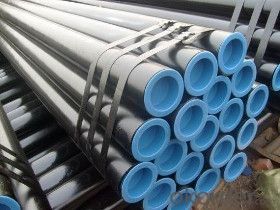
- Q: What is the difference between API 5L and ASTM A53 steel pipes?
- API 5L and ASTM A53 are two widely used standards for carbon steel pipes. While they both serve similar purposes, there are some key differences between them. 1. Scope: API 5L covers seamless and welded steel pipes for transportation of oil, gas, water, and other fluids. It also includes plain-end, threaded-end, and belled-end pipe types. On the other hand, ASTM A53 is a standard specification for seamless and welded black and hot-dipped galvanized steel pipes used for mechanical and pressure applications. 2. Manufacturing process: API 5L pipe is produced through a hot-rolling process, whereas ASTM A53 pipe is produced through a hot-rolling or cold-drawing process. This difference in manufacturing process affects the pipe's chemical composition and mechanical properties. 3. Chemical composition: API 5L pipe typically has a higher carbon content compared to ASTM A53 pipe. This is because API 5L pipe is used for conveying oil, gas, and water, which often require higher strength and durability. ASTM A53 pipe, on the other hand, is used for mechanical and pressure applications, where lower carbon content is suitable. 4. Mechanical properties: API 5L pipe has higher minimum yield strength and tensile strength compared to ASTM A53 pipe. This is due to the higher carbon content and stricter manufacturing process of API 5L pipe. ASTM A53 pipe has lower yield and tensile strength requirements, making it more suitable for general-purpose applications. 5. Coating options: API 5L pipe can be produced with various coating options such as black varnish, 3PE, FBE, and others, depending on the application requirements. ASTM A53 pipe is usually hot-dipped galvanized for corrosion resistance. In summary, API 5L and ASTM A53 steel pipes have different scopes, manufacturing processes, chemical compositions, mechanical properties, and coating options. Choosing the right pipe depends on the specific application requirements, such as the type of fluid being transported, the operating conditions, and the desired strength and durability.
- Q: What is the role of steel pipes in the mining and extraction of minerals?
- Steel pipes play a crucial role in the mining and extraction of minerals. They are widely used in various mining operations to transport water, slurry, and other fluids, as well as to provide structural support and ventilation in underground mines. One of the primary uses of steel pipes in mining is for transporting water or slurry. Water is essential in the mining process for various purposes, such as dust suppression, ore processing, and site rehabilitation. Steel pipes are used to create a network of pipelines that transport water from a source, such as a dam or reservoir, to different areas within the mine site. Similarly, slurry, a mixture of water and crushed minerals, is often transported through steel pipes to processing plants or tailings dams. Steel pipes also play a critical role in providing structural support in underground mines. Underground mining operations require tunnels and shafts to access valuable mineral deposits. These tunnels and shafts need to be reinforced to withstand the immense pressure exerted by the surrounding rock and prevent collapses. Steel pipes are used as support structures, such as roof bolts and rock bolts, to reinforce the walls and roofs of these underground excavations, ensuring the safety of miners and the stability of the mine structure. Additionally, steel pipes are used for ventilation systems in underground mines. Proper ventilation is vital in mining to ensure a constant supply of fresh air, remove harmful gases, and control temperature and humidity levels. Steel pipes are used to create ventilation shafts and ducts that facilitate the flow of air throughout the mine. This helps maintain a safe and healthy working environment for miners by preventing the buildup of toxic gases, dust, and heat. In summary, steel pipes are indispensable in the mining and extraction of minerals. They are used for transporting water, slurry, and other fluids, providing structural support in underground mines, and facilitating ventilation systems. Without steel pipes, the efficient and safe extraction of minerals from mines would be significantly hindered.
- Q: What material is RHS in the steel tube?
- SHS stands for thin-walled square steel tubes in the structure and represents the self ignition ceramic composite steel tube in the material
- Q: What are the different types of steel pipe caps?
- There exists a variety of steel pipe caps, each serving specific purposes and applications. A few commonly used types are as follows: 1. Threaded Caps: These caps possess internal threads that enable them to be screwed onto threaded pipes, ensuring a secure seal. They find frequent usage in plumbing and gas-related tasks. 2. Socket Weld Caps: These caps are designed for welding onto pipe ends using a socket weld connection. They offer a strong and permanent seal, rendering them suitable for high-pressure and high-temperature tasks. 3. Butt Weld Caps: Butt weld caps, similar to socket weld caps, are meant for welding onto pipe ends. However, they are specifically designed for butt welding, which involves directly welding the cap to the pipe without additional fittings. 4. Domed Caps: These caps have a domed or rounded shape on the upper surface, providing a smooth and visually pleasing finish. They are commonly applied in architectural and decorative tasks, such as handrails or fence posts. 5. Flat Caps: As the name suggests, flat caps possess a flat upper surface. They are often utilized when a simple and low-profile cap is required, such as for safeguarding pipe ends in industrial applications. 6. Blind Caps: Blind caps are employed to permanently seal off pipe ends. They are solid caps without any openings or threads, ensuring complete closure. They are frequently utilized in piping systems where a section of the pipeline is not in use or temporarily needs to be closed off. These examples merely scratch the surface of the various steel pipe caps available. The selection of a cap depends on specific application requirements, including the type of connection, pressure, temperature, and the necessity for structural or decorative finishes. It is crucial to choose the appropriate cap to guarantee a secure and reliable seal for the pipe.
- Q: Is the PVC tube a plastic tube or a plastic tube?.
- Or polymer polymerized by radical polymerization under the action of light and heat. The vinyl chloride homopolymer and vinyl chloride copolymer are collectively referred to as vinyl chloride resins. The material is a non crystalline material. PVC materials often use stabilizers, lubricants, auxiliary processing agents, pigments, anti shock agents and other additives in practical use. Is not flammable, high strength, excellent resistance to climate variability and geometric stability. PVC has strong resistance to oxidizing agents, reducing agents and strong acids. However, it can be corroded by concentrated oxidizing acids such as concentrated sulfuric acid and concentrated nitric acid, and it is also not suitable for contact with aromatic hydrocarbons and chlorinated hydrocarbons.
- Q: What are the common sizes of steel pipes?
- Common sizes of steel pipes can vary depending on the application, but some common sizes include 1/2 inch, 3/4 inch, 1 inch, 1.5 inches, 2 inches, 3 inches, 4 inches, 6 inches, 8 inches, 10 inches, and 12 inches in diameter.
- Q: What are the advantages of using steel pipes in the mining industry?
- There are several advantages of using steel pipes in the mining industry. Firstly, steel pipes are extremely durable and can withstand harsh environmental conditions and heavy loads, making them ideal for underground mining operations. Secondly, steel pipes have high tensile strength, which allows for the transportation of large volumes of materials, such as ore or waste, over long distances. Additionally, steel pipes are resistant to corrosion and erosion, ensuring a longer lifespan and reducing maintenance costs. Lastly, steel pipes are relatively easy to install and can be welded together, providing flexibility in designing and constructing mining infrastructure.
- Q: Can steel pipes be used for the construction of tunnels?
- Yes, steel pipes can be used for the construction of tunnels. Steel pipes are commonly used in tunnel construction for various purposes such as drainage, ventilation, and utility installations. They are strong, durable, and can withstand high pressures and loads, making them suitable for tunnel applications. Additionally, steel pipes can be easily fabricated, installed, and maintained, making them a popular choice in tunnel construction projects.
- Q: Can steel pipes be painted?
- Yes, steel pipes can be painted. Painting steel pipes provides protection against corrosion, enhances their aesthetic appearance, and can help them blend with the surrounding environment. Prior to painting, the pipes need to be cleaned, primed, and then coated with a suitable paint designed for metal surfaces.
- Q: What are the standard dimensions and weight of steel pipes?
- The standard dimensions and weight of steel pipes vary depending on the specific type and grade of pipe. However, there are some common standard dimensions and weight ranges that are widely accepted in the industry. For seamless steel pipes, the standard dimensions typically range from 1/8 inch to 60 inch in outer diameter (OD) and from 10.3 mm to 914.4 mm in wall thickness. The weight of seamless steel pipes can vary from a few kilograms to several metric tons, depending on the size and length of the pipe. Similarly, for welded steel pipes, the standard dimensions range from 1/2 inch to 80 inch in OD and from 3.2 mm to 25.4 mm in wall thickness. The weight of welded steel pipes can also vary greatly, ranging from a few kilograms to several metric tons. It is important to note that the dimensions and weight of steel pipes can be customized based on specific project requirements. Additionally, different countries or regions may have their own standards and specifications for steel pipes, so it is always advisable to consult the relevant standards and guidelines when determining the dimensions and weight of steel pipes for a particular application.
Send your message to us
Carbon Seamless Steel Pipe API 5L of 4 Inch Hot Sale Structuer Application
- Loading Port:
- Tianjin
- Payment Terms:
- TT OR LC
- Min Order Qty:
- 30 m.t.
- Supply Capability:
- 12000 m.t./month
OKorder Service Pledge
OKorder Financial Service
Similar products
Hot products
Hot Searches
Related keywords
